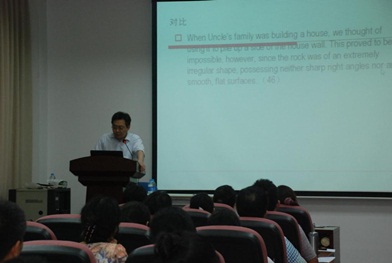A Bad Principal Taught Me a Good Lesson
She stood at the front of the room, hands on hips, and faced us all as if we were prisoners. “Keep in mind that I’m the boss,” she said. “You will do as you are told, and if you don’t, I’ll make your lives miserable!”
This was my first faculty meeting of the year, as a new teacher my first ever, and this woman was my principal.
Fresh out of college, I had accepted the position of kindergarten teacher at a public school. The principal arrived at the same time. From day one, she made it clear that it was time for some changes. Instructors with seniority were dismissed, and quickly replaced with the new principal’s close friends. An elderly teacher with a physical disability was moved upstairs to a new classroom. When she asked if she could return to her former room, the principal replied, “Deal with it.” Upset, the staff began to complain, but nothing changed. New and inexperienced, I decided to keep my mouth shut.
Young, vulnerable, and reluctant to stand up for myself, I was the perfect victim. While everyone labored under the tension, by my second year it became a personal battle. She was out to get me. Her first hostile action was to move me, without cause, to a different classroom in a noisy, high-traffic area. When I told her that parents had protested that this environment interfered with the children’s learning, she lashed out, “You’re staying exactly where you are, and you’d better deal with the parents, because I won’t!”
She would yell at me in front of my colleagues. “Can’t you do things right?” “You’re still a baby wearing diapers.” “Come down from the clouds.” “You’re too much of a dreamer.” She never missed an opportunity to humiliate me.
In my third year my classroom was moved once again, this time to a small, depressing storage room without windows or fire escapes. Occasionally the principal would stalk into my classroom, demanding that students “shut up.” Sometimes she scribbled notes, occasionally giving me a contemptuous glance. I knew that even though I did my job to the best of my ability, it was never good enough. Although the performance assessments I received were acceptable, she never discussed them with me. She simply grunted “Sign here,” thrusting forward the evaluation sheet.
After three years of working in this environment, my health became affected. I experienced bad headaches and grew increasingly depressed. Day after day, I woke up with a knot in my stomach knowing I had to face the “monster.”
Then I found a ray of hope. I’d read these words by former first lady Eleanor Roosevelt, “You’re nobody’s victim without your permission.” I knew that I had to take control of my life and stop blaming my principal. I couldn’t control her behavior, but I could control my reactions to it.
I decided to attend a seminar that emphasized effective communication strategies. There I learned that bullies are usually cowards who act upon their fears and insecurities. I also learned non-confrontational phrases to use in conversation, such as prefacing a statement with “In my opinion.”
I planned ahead when I knew I would have to speak one-on-one with the principal. First, I would gauge her mood that day, and if I found her unapproachable, I would write her a note requesting a meeting. And I mustered my courage and contacted my union representative for advice.
She recommended I document everything my boss said and did to me. If she asked to meet with me, I should insist on having a third party present. In addition, the representative provided me with a guidebook listing my legal rights.
A group of teachers and I formed a support group, and we brainstormed ideas on how to handle our boss. Our most successful tactic was to substitute positive, self-supportive thoughts for negative ones, such as “Problems can be seen as challenges as opposed to setbacks,” and “Somewhere in this experience is an opportunity for growth.” When repeated again and again, these affirmations became believable. We also studied books on the topic of dealing with difficult people, which gave tips such as: Stand up for yourself; stand up straight and make eye contact; and take time to know the person.
I proved one of these maxims true while chatting with my principal about the beautiful performance of the leading dancer in the Nutcracker Suite. Coincidentally, my boss shared my passion for ballet and had seen the same performance. I discovered that she had another side to her, previously hidden. I began to see her with different eyes. We now had something in common, and her abuse slackened.
Little by little, I regained my confidence and started to see changes. My principal began communicating with me without yelling. She began making time to listen to my thoughts and opinions. One day after a classroom observation, she actually complimented my creative writing lesson. Although my principal and I never became friends, by the end of the school year we managed to develop a healthy respect for each other.
Two years later, I was given an opportunity to teach at a superior school, one with a supportive and encouraging principal, and I chose to make the change. I do not regret, however, my time at my first school because I came away with a valuable lesson. I learned that I would never again allow myself to be a victim.
人生一课
她站在教室前面,两手插着腰,像看囚犯一样地看着我们,“记住,我是你们的老板,”她说,“你们想日子好过的话,就乖乖照我说的去做,否则,别怪我不客气!”
这就是我当老师第一天开教务会时的情景,而这个女人就是我的校长。
大学刚毕业,我就应聘到这家公立幼儿园里当老师,校长也是新来的。开学第一天她就明确表示要实施一些改革措施。一些有资历的老师被解雇,取代他们的是新校长的熟人。一位腿脚不灵便的老教师被调到了楼上的教室上课,当她问校长是否能把她调回原来的课室上课时,校长回答说:“就这么决定了!”那教师觉得很委屈,可她的抱怨根本无济于事。想着自己是新来的,又没有什么经验,我决定对一切都缄口不言。
这样一来,年轻、软弱、不敢坚持自己立场的我就成了绝佳的牺牲品。尽管大家都在她的高压下战战兢兢地干活,但到了第二年的时候,慢慢就演变成了一种私人恩怨。她专门找我的茬儿。她的敌意首先表现在课室的编排上,无缘无故地她把我的课室安排在吵闹的高速公路旁。我向她转达了家长的意见,因为那样会影响孩子们的学习。然而,她却生气地嚷着说:“你就给我在那间教室里呆着,家长的事你自己搞掂,总之我是不会出面的!”
她还会当着其他同事的面冲我大喊大叫,“你怎么老做错呢?” “你以为你自己还小啊!要我帮你换尿布吗?” “别老魂不守舍的。”“你简直是白日做梦!”总之一有机会,她都会百般地羞辱我。
到了第三年,我又得搬教室了。这回的课室是间又小又压抑的储物室,既没有窗户也没有走火通道。校长不时地闯进我的教室,叫学生们“闭嘴”;有时候就我的课她会胡乱地记些东西,还会轻蔑地看我几眼。我心里明白,即使我已经尽力去做了,她也不会满意的。根据教学评估表我知道她认可了我的表现,但她却从没找我谈过话。每一次,她都只是对我说:“在这签个名。”然后便把评估表递给我。
三年如一日地在这种环境下工作,我的健康大不如前。我老是头痛,人也变得越来越压抑。每天醒来,想着自己还要面对这么一个不可理喻的怪物,都让我内心感到异常难受。
后来我终于发现了希望的曙光。当我读到前第一夫人罗斯福?埃莉诺这样一句话“没有你的允许,谁也不能伤害你”时,我豁然开朗。我必须掌握自己的命运,而埋怨校长根本解决不了问题,她的行为我控制不了,我却可以控制自己的应对方法。
我决定参加一个教人如何进行有效交流的研讨会。通过那次研讨会,我明白了其实那些欺凌弱小的人往往都是一些胆小鬼,他们因为感到恐惧、缺乏安全感所以才欺凌弱小;同时我也学会了与人交谈的时候,可以运用非对抗性语言,譬如在陈述一个观点时加上“依我看来”。
在我和校长单独谈话之前,我做足了准备工作。首先,我会揣摩她当天的情绪,当发现她脸色不对时,我就乘机写字条要求和她面谈。然后我就鼓足勇气联系我的工会代表征求他们的意见。
工会代表建议我先把老板对我说过的话和做过的事整理成文件,如果老板答应见我,我应坚持要有第三者在场。另外,工会代表还给了我一份员工权力手册。
我还和一群老师组建了一个互助小组,对如何应付校长大家群策群力。我们最成功的策略就是一改以往的消极态度,采取正面积极的心态,譬如说,“与其把遇到的问题看成是挫折,还不如把他们看作挑战,”,“在困难的时候往往隐含着扭转的契机”。我们不断用这些话语为自己打气,效果也相当明显。而且我们也研究了相关的书籍,学到了许多与难相处的人相处的点子,比如:坚持立场、挺直腰板、眼睛看着对方、抽时间去了解这个人等。
有一回我和老板碰巧谈论起《胡桃夹子》中主演的精彩表演,我深深叹服那几句名言的正确性。因为很碰巧的是,我老板和我一样喜欢芭蕾,她也看了那场表演。我发现了她的另外一面,以前我们不曾看到的一面。我开始以不同的眼光认识她,而我们终于有了共同的语言,她也很少乱骂人了。
渐渐地,我重拾了自信并看到了校长身上的变化。她开始跟我谈心,而不再冲我大声吆喝;她也开始抽时间倾听我的意见和想法。有一天,在听完我的课后,她还对我的写作课表示赞赏。尽管我们从来没成为朋友,到了那学年末,我们彼此之间建立了尊重和信任的关系。
两年后,我获得了一个机会到另外一所更好的学校任教,那儿的校长很友好。我选择了离开原来的学校。但我从来也不觉得我在以前那所学校的时间是白费的,因为我学到了非常珍贵的东西,我永远也不会让自己成为伤害的对象。















